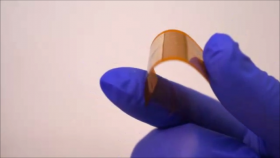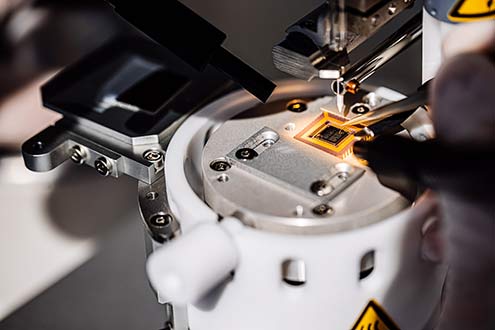Graphene enables the most sensitive flexible Hall sensors
 Researchers from AMO GmbH recently demonstrated a graphene based ultrathin and fully flexible Hall sensor device. The sensitivity is the highest for any flexible Hall sensor and competes with the established silicon based sensors. The demonstration at this year’s Mobile World Congress in Barcelona attracted wide interest from the industry around the world, because flexibility and minimum space requirement is essential for several emerging areas such as wearable electronics, electronic skin, highly integrated machines, robotics and prostheses.
Researchers from AMO GmbH recently demonstrated a graphene based ultrathin and fully flexible Hall sensor device. The sensitivity is the highest for any flexible Hall sensor and competes with the established silicon based sensors. The demonstration at this year’s Mobile World Congress in Barcelona attracted wide interest from the industry around the world, because flexibility and minimum space requirement is essential for several emerging areas such as wearable electronics, electronic skin, highly integrated machines, robotics and prostheses.
Hall sensors are widely used in automotive and consumer electronic products, where they precisely detect positions or monitor currents. The most commonly used Hall sensor is currently based on rigid silicon CMOS technology due to the mature and cheap fabrication process. In contrast to established silicon, the 2D material graphene delivers very high carrier mobility and low sheet carrier density, which are crucial to achieve high sensitivity for the magnetic field detection. Therefore, in combination with the excellent flexibility of graphene, it can be considered as the perfect material for flexible Hall sensors.
Wang and coworkers from AMO GmbH fabricated and characterized flexible Hall sensors on a 50 µm thick polyimide foil using large scale graphene grown by chemical vapor deposition. The voltage and current normalized sensitivities reach up to 0.096 V/VT and 79 V/AT, respectively. These values are comparable to that of broadly used rigid silicon based Hall sensors and significantly outperforming all flexible Hall sensors so far by more than one order of magnitude. The sensitivity of the Hall sensor stays stable for bending radius down to 4 mm, corresponding to a tensile strain of 0.6%, and shows no degradation after 1,000 bending cycles to a radius of 5 mm. Therefore, this work will enable upcoming applications in fields such as bio-medicine, robotics, wearable electronics or electronic skin.
The research work is published in the journal of Nanoscale:
Zhenxing Wang, Mehrdad Shaygan, Martin Otto, Daniel Schall, and Daniel Neumaier
“Flexible Hall Sensors Based on Graphene”
This work is financially supported by the European Commission under the projects Graphene Flagship (contract no. 604391), SPINOGRAPH (contract no. 607904) and by the German Science Foundation (DFG) within the priority program 1796 FFlexCom Project “GLECS” (contract no. NE1633/3).
DOI: http://dx.doi.org/10.1039/C5NR08729E





